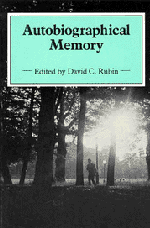Book contents
- Frontmatter
- Contents
- List of contributors
- Preface
- Part I Overview
- Part II Historical, theoretical, and methodological contexts for the study of autobiographical memory
- Part III The general organization of autobiographical memory
- Part IV The temporal organization of autobiographical memory
- Part V Temporal distributions of autobiographical memories
- Part VI Failures of autobiographical memory
- 13 Amnesia, autobiographical memory, and confabulation
- 14 A case study of the forgetting of autobiographical knowledge: implications for the study of retrograde amnesia
- 15 Loss and recovery of autobiographical memory after head injury
- Author index
- Subject index
13 - Amnesia, autobiographical memory, and confabulation
Published online by Cambridge University Press: 01 March 2011
- Frontmatter
- Contents
- List of contributors
- Preface
- Part I Overview
- Part II Historical, theoretical, and methodological contexts for the study of autobiographical memory
- Part III The general organization of autobiographical memory
- Part IV The temporal organization of autobiographical memory
- Part V Temporal distributions of autobiographical memories
- Part VI Failures of autobiographical memory
- 13 Amnesia, autobiographical memory, and confabulation
- 14 A case study of the forgetting of autobiographical knowledge: implications for the study of retrograde amnesia
- 15 Loss and recovery of autobiographical memory after head injury
- Author index
- Subject index
Summary
One approach to the understanding of normal cognitive function is to investigate its breakdown following brain damage. In the area of memory this has proved a very profitable strategy; typically, concepts and techniques developed in the psychological laboratory have been used to analyze memory deficits in the clinic, and this in turn has frequently led to further development and modification of the initial model of normal memory. This chapter is concerned with the early stages of an attempt to approach autobiographical memory within this tradition. Because the study of autobiographical memory in normal subjects is still at a very early stage of development, conclusions are likely to be tentative. We shall be concentrating, however, on a phenomenon that we believe to be sufficiently striking and unequivocal to allow some conclusions, even though our data on normal control subjects are still sparse. We believe that our results, although preliminary, raise interesting questions both for the understanding of normal autobiographical memory and for its breakdown in amnesic patients.
We shall begin by describing our current technique for investigating autobiographical memory, together with its application to a range of patients, most of whom were suffering from long-term memory problems. After a general overview of the autobiographical memory performance of these patients, we shall concentrate on four patients with frontal lobe damage, two of whom show clear evidence of confabulation. These latter patients will be described in more detail, an explanation of their autobiographical memory defect will be proposed, and its implications for autobiographical memory in normal subjects will be discussed.
- Type
- Chapter
- Information
- Autobiographical Memory , pp. 225 - 252Publisher: Cambridge University PressPrint publication year: 1986
- 120
- Cited by

